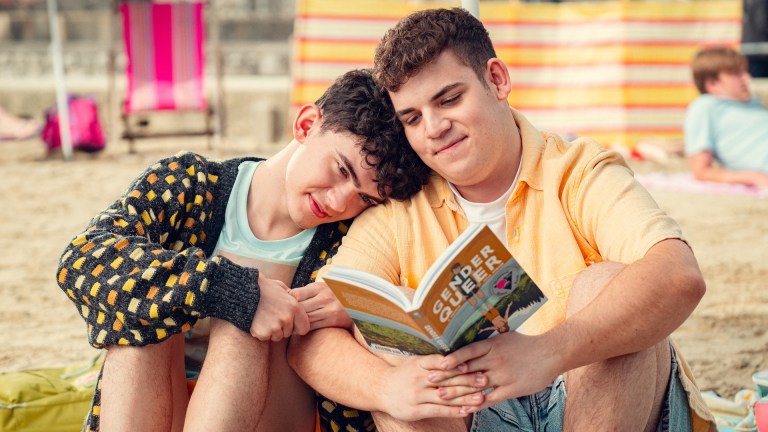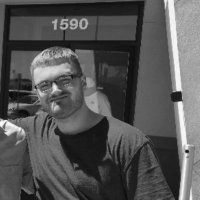Heartstopper Season 3 Brings Asexual Representation to Mainstream Audiences
Heartstopper season 3 saves some time for Isaac Henderson's (Tobie Donovan) important journey of self-discovery.

Entering its third season, Netflix’s teen drama Heartstopper has torn to shreds the previous expectations set upon LGBTQ+ coming-of-age series. The show, based on Alice Osman’s web comic and graphic novels, fearlessly tackles topics that others often ignore, and its actors and writers make it a point to normalize those who feel unseen or different. The world of Heartstopper is how all queer teenagers should experience life, regardless of who they are attracted to. The show has nearly every orientation in the pride-filled acronym covered, and season 3 takes special care to recognize one particular category in the “plus” umbrella that goes almost entirely invisible on the silver screen: asexuality.
There are approximately 70 million ace individuals on the planet right now, or 1% of the entire global population. The United Kingdom’s entire occupancy is a little over 69 million. In other words, if you think that a group of people the size of an entire world superpower should just be overlooked, think again. According to GLAAD, there were 327 queer characters on original scripted TV during the 2023-2024 season. Each one of these people’s stories inspires and comforts those who have nowhere else to look while watching from home. How many of those queer characters are asexual? Four.
Isaac Henderson (Tobie Donovan) from Heartstopper is one of those ace characters. The first season of the series put Isaac firmly in the periphery of the action, often reading a book or providing some comic relief with an off-the-cuff piece of sarcasm when Charlie (Joe Locke) or Tao (William Gao) needed some humbling. Unlike his besties, Isaac doesn’t get involved with anyone romantically. He doesn’t have any outward crushes, and his personality is often used as a reflection of the main characters.
Isaac’s asexuality is explored more in season 2 when he shares an awkward first kiss with a classmate, James McEwan (Bradley Riches). He doesn’t get the warm fuzzies or the colorful butterflies that litter the screen when other teens in the cast smooch, but rather a confusing search down the internet rabbit hole. Isaac decides that he’s asexual and aromantic, and the show dives headfirst into this story in season 3.
One of the defining scenes in Hearstopper’s third outing happens when the friend group takes a day trip and looks at an aquarium. Feeling left out from the rest of his own personal school of fishies, Isaac comes out to Nick (Kit Connor), Charlie, Tao, and the rest of the gang with an apt analogy. Upon a discussion about whether any of the animals behind the tank are gay, Isaac asks “What about the ones who don’t fall in love with any gender? Do you think they’re okay just being on their own?”
Nick has just the right thing to say, as always: “I don’t think they’re on their own. They’ve got loads of friends.” Isaac admits he doesn’t quite understand what his future holds as someone who is asexual and aromantic, but he does walk away knowing that his friends all love and care about him, and they see him just the same as before.
With Isaac’s expanded story, Heartstopper manages to differentiate ace people from other queer folks while also confirming that the coming-out processes of each share sexuality parallel DNA. Isaac probably always imagined holding hands with a special someone, getting married to a soulmate, and sharing a life with that person. Ace people don’t harbor those heteronormative or homonormative attractions. At the same time, asexuality and aromanticism are ignorantly misunderstood. Ace individuals still desire love and companionship, but it’s often more in line with how someone loves their parents or their best friends. Showing Isaac as someone who is mourning the loss of the traditional life he imagined while embracing the affection his heart yearns for normalizes people on the ace spectrum in a way no other teen show has before.
Signifying the difference between asexual representation on adolescent-targeted TV and ace rep in other genres remains vital. Todd Chavez (Aaron Paul) on Netflix’s BoJack Horseman made history as perhaps the most famous asexual character on the small screen in the 2010s. BoJack doesn’t exactly share a lot of similarities with Heartstopper, and their audiences are probably drastically different. Both serve the same purpose, though: to give real-life ace people a chance to rationalize their sexualities in the face of extreme contrast bombarding them at every corner.
Without representation, asexual individuals are going to continue to feel excluded from society. TV serves as an echo chamber for the human experience. What we put into our series reflects society at large. Isaac’s asexual experience lets lost young members of the ace community know they are just as valid as their straight, gay, and bisexual peers. It’s not hyperbolic to write that this storyline could change the lives of an entire generation of asexual youth.
Heartstopper has gotten pretty used to perpetuating these lofty standards. It’s where the auspicious masterclass gets into its comfort zone and really sings the rainbow. Whether it’s showing older gays who have never loved that it’s not too late, or coloring a new stripe in the sky for baby aces who want a role idol, this series always finds a way to light up queer TV with positivity and hope for the future.
All eight episodes of Heartstopper season 3 are available to stream on Netflix now.
